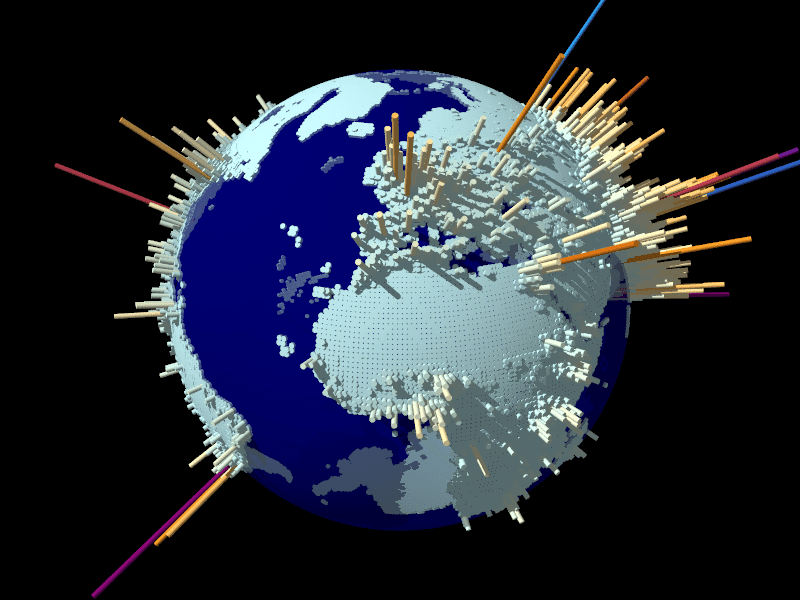Over fifty years ago, human influence on global systems began to expand rapidly. As population rose, we began using more resources than could be renewed.
Something happened fifty years ago. Not precisely fifty years, mind you, and not all at once, but give or take a decade or so, there was a fateful shift in the complex dance of interactions between people, technology, and the natural world. And now, there may be no going back.
Think about the way the world was fifty years ago. The first humans flew to space, the Cuban missile crisis was averted, and the United States began using Zip Codes. President John F. Kennedy and Dr. Martin Luther King, Jr. were assassinated. New cars cost about $3000 and were required to have seatbelts, but wearing them wasn’t mandatory. A gallon of gasoline cost about $0.30, local calls meant dialing 7 digits on a rotary, corded telephone, and Richard Nixon won the presidency, ushering in the kind of corruption that could force a President to resign (at least in those days).
Underneath the big, splashy changes were others, more subtle. Take the Eastern Coyote, for example. It’s a varied mix of coyote, dog, and wolf genes. The coyote/dog hybridizations took place around fifty years ago, according to DNA evidence. In the 1960s, the U.S. population crossed the 200,000,000-person point; were the coyotes pushed out of the wilderness by an expanding human presence, or did people and their dogs encroach into coyote territory?
Another clue lies in a Sitka spruce on an island 400 miles south of New Zealand. Here, far from civilization, researchers found a fifty year old spike of radioactivity related to atomic bomb testing recorded within the spruce’s woody rings. Human impact had gone global.
Fifty years ago, we started relying even more on petrochemicals. Since people started mass producing plastic in the 1950s, it’s safe to assume that we started trashing the oceans with it over fifty years ago. That’s also when the oil industry was warned about the serious effects that an accumulation of carbon dioxide could have on Earth’s climate. They responded by spending millions of dollars to promote climate confusion and denial.

The collective human demand for resources such as food, fiber, and timber, and the amount of waste we return to the environment to be digested, is reflected in a figure called the “ecological footprint.” These needs are provided by the natural services and “biocapacity” of the environment around us. Nearly fifty years ago, our ecological footprint began to outpace the planet’s annual biocapacity, which is why we hear about the “number of Earths” we need to maintain a given standard of living. How is that possible? Because we lived within our ecological means for so long, the extra biocapacity we didn’t use meant fully stocked fisheries, forests, and good deep soil, and using these resources faster than they replenish themselves is how we’re able to exceed our annual allotment on a regular basis now. It’s a trick that won’t last forever.
While turning the natural ecosystem into human prosperity and therefore into more and more humans has ushered in a world with conveniences and wonders like we’ve never seen, is it worth it? We have smart phones, but we also have people demanding plastic surgery so they can look more like their Snapchat-filtered selfies. We have cheap, processed convenient food everywhere in portions that make food from fifty years ago look positively sparse, but we’re also vulnerable to manipulation by marketers of unhealthy food that makes us sick. Amazon makes it easier than ever to buy anything our hearts desire, but do we desire to be surrounded by so much stuff that experts are required to help us declutter? Technological innovations were supposed to mean less work and more leisure, but now we work longer hours for stagnant wages to afford it all.
The Great Acceleration took off in the 1950s, but if we want to step back from the abyss, we need to find a way to put that genie back in the bottle. Luckily, cracks are appearing. The global ecological footprint decreased by 1.1% in 2014 (the last year with complete data) over 2013. More people are becoming interested in regenerative agricultural practices, like these farmers-turned-ranchers whose grazing practices brought back soil life, including species of beetles that were last seen in West Sussex fifty years ago.
It’s not enough to unbleach the coral or bring the climate-migrant species back down from the mountaintops, but something is better than nothing. Any fraction of a chance that we can give our children in a changing world is a chance they wouldn’t have otherwise.
Related: People Finally Noticing Insect Collapse


Join the conversation!